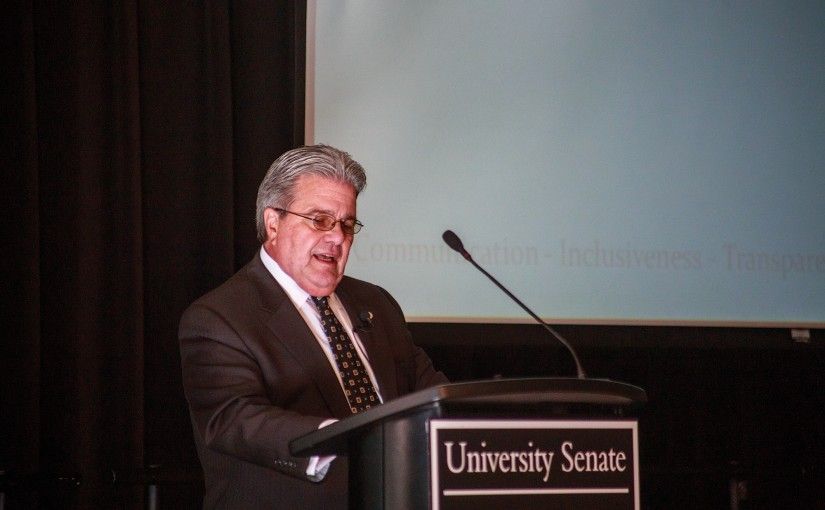Months after University of Maryland President Wallace Loh announced his plans to retire, University System of Maryland Chancellor Robert Caret shared who would sit on the committee to search for his successor in a campuswide email Wednesday.
Among the 20 members of the committee are faculty, staff, students and alumni of this university. The committee includes former university president William “Brit” Kirwan, Caret’s immediate predecessor, and former men’s basketball coach Gary Williams. It will be chaired by USM Regent Gary Attman, and an executive search firm — Isaacson, Miller — will assist in the process.
The committee was assembled after a “lengthy and deliberative process” in which the University Senate, campus leaders and other members of the community were consulted, Caret wrote.
“Identifying the next leader of the system’s flagship institution—and one of the nation’s best public research institutions—is an obligation the board takes extremely seriously,” he wrote, adding that the search is expected to take up to a year or more.
Loh unexpectedly announced his intention to retire at the end of this academic year at an Oct. 30 press conference amid backlash over the university’s handling of the death of offensive lineman Jordan McNair, who succumbed to heatstroke after a May workout.
[Read more: UMD Senate wants future presidential search committees to have more students]
But for three months, the board made no move to launch a search for Loh’s successor — until late January, when the president announced he’d stay on in his role until June 2020.
The regents have faced widespread criticism for their handling of administrative affairs at this university.
The board reportedly pressed Loh to retire amid a conflict over head football coach DJ Durkin’s future at this university. The board wanted Loh to retain Durkin — although an investigation found that he bore responsibility for abuse in the program — but Loh ultimately fired him.
Then, after a closed door meeting between the regents and the president in January, regents chair Linda Gooden announced that they had “mutually agreed that it is in the university’s best interest” for Loh to stay on.
This turn of events — and the manner in which they took place — prompted swift outcry from student leaders and governing groups across campus, with one member of the University Senate calling the move a “slap in the face.”
[Read more: Wallace Loh discussed plans for UMD’s presidency with USM for three months]
Graduate Student Government President Annie Rappeport, the graduate student representative on the committee, said she was heartened by the email sent around to the campus Wednesday, as it provided a full listing of the committee’s members.
She was especially pleased by its announcement of an open forum, which will be held on May 8 and give community members a chance to offer their input on the search process.
“I’m very much hoping that what has appeared to be a very kind of closed-off process until now won’t feel like that anymore,” Rappeport said.
Committee member Debabrata Biswas, an animal sciences professor originally from Bangladesh, said he hopes to use his background to find a person with “broad” views who can act on the opinions of all, including international students.
Biswas added that he’s looking for a president who will be able to communicate well with the state government on behalf of student and faculty needs.
“You need to convince state policymakers so they will support your ideas and they will provide enough money or resources that you can achieve your goal,” Biswas said.
Like Rappeport, Kayla Burch wants a president who is more “student-focused.” The sophomore English major, who will serve on the committee, said she’s tired of decisions being made without student input and wants to find a president with a background in education.
“Without the students, there is no University of Maryland,” Burch said. “It seems up until now that every issue has been brushed aside and disregarded.”
In the past few years, new office spaces, technology companies and restaurants have popped up across the city and the Discovery District in a joint effort to make College Park a top-20 college town by 2020. During this era, the school and Loh have taken a “very business-oriented” perspective, Burch said — something she hopes will change.
“Economic development in College Park is a great thing, fostering jobs in our community,” Burch said. “But at the same time, economic development isn’t the only thing that the University of Maryland needs. I would want to see someone that has a great idea of what it means to be a student.”
Moving forward, Rappeport and Burch said they’ll be reaching out to students to develop a sense of the qualities they’d like to see in the future leader of this university. But in the meantime, Rappeport has her own thoughts.
“I want the decisions of the university at the top administrative levels to be first and foremost for the students,” she said. “I don’t think people are setting out not to be student-centered right now, but [we need] a broader discussion of what does that mean concretely in the day-to-day operation of the university.”
This story has been updated.



